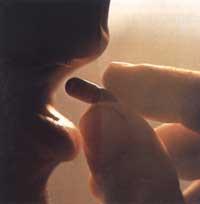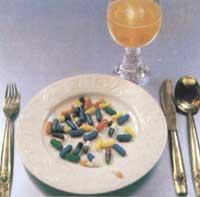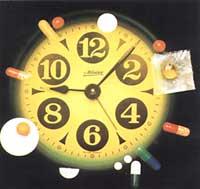Antibiotics: yes or no?
1993/12/01 Agirre, Jabier - Medikua eta OEEko kidea Iturria: Elhuyar aldizkaria
Insurance.
Antibiotics are given at any age and can be given this way, even in newborns. The most important thing is if you really manage antibiotics is a price. As a general rule, in diseases caused by viruses (and taking into account that many of the waterfalls are viral in children) should not be given antibiotics, since in viruses they have no efficacy.
If the child is healthy and the symptomatology is light, the drugs will be given against the symptoms (pain relievers, antithermic fever, antithermic) because the child's natural defenses are sufficient. Only when bacterial complications (tonsillitis, otitis, bronchitis, ...) will antibiotics be received. It is essential to maintain the appropriate dose at least between 7 and 10 days to remove the germ and avoid relapses. Antibiotics should never be removed before time, for example, because the fever has disappeared.
Alexander Fleming is considered the father of antibiotics, after finding penicillin in 1928. And from then until now, biomedical research continues to discover new antibiotics that are improving their efficacy and safety.

With these drugs, millions of deaths have been avoided worldwide (many of them due to diseases that today seem almost banal, like the flu). Like many other medications, antibiotics themselves are not dangerous, at least if taken under the doctor's guidance.
They are so used that everyone knows for their advantages and drawbacks the different antibiotic topics. But are all those topics true?
* Taking antibiotics gives a lot of beating
Answer: False false
This widespread conviction is nothing certain. Antibiotics do not waste or weaken the body's defenses, since the infection is responsible for those consequences. Some antibiotics that act on the bone marrow would weaken very few and certain, but are not currently used.
* Some people are allergic to antibiotics
Answer: True Certain
Like some people with pollen or loraut, mites (dusty), milk and other substances are allergic, antibiotics, although they are not harmful in themselves, can produce allergic reactions, as long as the body is in contact with them.
But being allergic to an antibiotic does not mean being allergic to others. Of the penicillin group (anoxicylinders, ampoules, etc.) The most common antibiotics are cephalosporins.
The symptoms of an allergic response can be very different. They can be light (gastric discomfort, skin irritability) but also very serious. Usually allergy does not appear in the first contact with the antibiotic, but in some subsequent infection (once administration is repeated).
As soon as you are taking antibiotics and a rare reaction is detected, you should go to the doctor. It is not known that allergies appear in childhood more often than in adults, nor vice versa.
* Do not interrupt treatment even if symptoms disappear
Answer: True Certain
It is very important that medical orders are fulfilled as strictly as possible: the doctor will indicate the time to be taken, the interruption of the medication and the most appropriate way to take it.
An error that is frequently made is to stop treatment when an improvement is seen and symptoms (some or most) of the disease disappear.
* Should be taken at least 5 consecutive days
Answer: True Certain

Or even for longer. If the doctor does not prescribe more days of treatment, the general rule is to take antibiotics between eight and ten days. In most cases that are not recorded, the treatment is able to overcome the infection during this period. Why that deadline?
- Because when bacterial infection occurs, germs multiply rapidly.
- Because the drug needs a time to reach the focus of the infection. And to inhibit and destroy a lot of bacteria that are creating that focus, the antibiotic needs a few days.
* They can also damage the intestinal flora
Answer: True Certain
This is mainly due to prolonged treatments and the use of very resistant antibiotics. Frequent infections (bronchitis, urinary, throat, etc.) It does not occur with doses of treatment. But in case of vomiting or diarrhea, it is advisable to consult the doctor.
* They are dangerous so it is not convenient to take them frequently
Answer: False false
They are never dangerous if the doctor has properly prescribed them. If you recite yourself, then yes, it can be dangerous. The first risk of self-medication would be therapeutic failure, that is, not to cure the disease. Another, that in case of misuse covers some serious infection (for example, that a pharyngitis ends with a more serious complication, meningitis, etc. ).
Therefore, they should never be taken if the doctor has not prescribed it, since it is the most suitable doctor for each case and how to do it.
On the other hand, it is true that taking antibiotics is rare, since resistance can appear and the antibiotic would lose its effectiveness to cure the infection.
* If taken frequently lose efficiency
Answer: True Certain
Bacteria are pathogenic microorganisms that cause infection and antibiotics are used in the case of bacteria.
But the bacteria have a defensive mechanism, called resistance, so that the antibiotics do not attack them. And the more frequent a single antibiotic is put in contact with bacteria, the easier it will be to know the drug and launch its defense mechanism to combat it, so the antibiotic will lose effectiveness.
This is another reason why antibiotics are not used in any way. It is better to consult before the doctor, who will take into account all these factors.
* Antibiotics are the best remedy against rayante
Answer: False false
Normally hoarseness (cooling) is produced by viruses and antibiotics are only effective in bacterial infections. The same happens with the flu. However, sometimes the doctor may prescribe antibiotics to prevent or cure bacterial infections that can be accompanied by flu or waterfalls (pharyngitis, tonsillitis, and other more serious complications).
* Most winter diseases without antibiotics
Answer: True Certain

In theory it is so. As we have seen, most flu and hoarseness or cooling are viral infections, which are only cured, without antibiotics. Follow some well-known advice or recommendations: be careful with the cold, pass in bed if it takes a few days, etc. Antipyretics and analgesics are usually given to reduce fever and relieve discomfort.
* Antibiotics are very harmful to the stomach
Answer: False false
An antibiotic administered orally does not have to damage the stomach, unless the patient has previous stomach problems and is taken following the doctor's instructions. It is very possible for the antibiotic to harm someone who has an ulcer or other gastric disease. Very potent antibiotics can cause this kind of discomfort in prolonged treatments.
* Avoid breastfeeding to avoid damage to the fetus
Answer: False false
If a pregnant woman suffers an infection that is not properly treated, she is in danger and the fetus is also. The gynecologist is the specialist in studying each case and deciding the most appropriate treatment to cure the infection. The practice has shown that currently there are antibiotics that are effective and not teratogenous (especially of the penicillin group and cephalosporins), that is, they cure the infection and do not produce any type of malformation or defect in the fetus.
In women mycosis are easier to detect with antibiotics
Answer: True Certain
When broad spectrum antibiotics are administered (that is, capable of fighting a large number of germs) and are administered for long periods of time, in the vaginal flora a good cleaning can be done, with the consequent appearance of mycosis, h.d. Fungal infection. Therefore, if during the taking of antibiotics a woman has a state of haste and high flows in her genitals, it is advisable to go to the doctor to change treatment.
Only the doctor can receive antibiotic orders and how to give them: orally (pills, envelopes, syrups), gluteal (suppositories) or intramuscular (injections). The healing efficacy of the antibiotic infection depends on factors such as the appropriate antibiotic for infection, the pathway through which it is administered, and the dosing guidelines, and the duration of treatment. This last point is very important. The deadline prescribed by the doctor must be strictly respected. For example, if you say you have to take it every eight hours. Anyway, without excesses: don't put the alarm clock for example, because you have to take it at midnight. Come to your normal life. They do not have to match meals and do not need to take anything solid along with the medication when taken between meals (except medical indication). |

Gai honi buruzko eduki gehiago
Elhuyarrek garatutako teknologia






